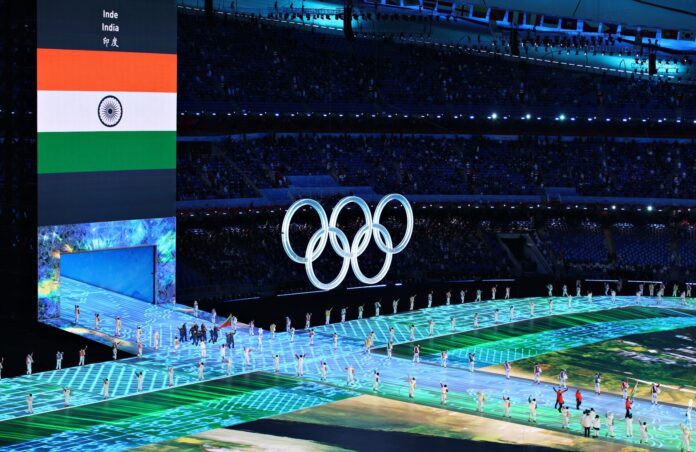As the Indian government expresses a keen interest in hosting the 2036 Summer Olympics, significant financial and social concerns make this ambition appear ill-advised.
Mounting Costs Amid Inflation and Economic Strain.
India’s ambition to host the 2036 Summer Olympics raises pressing questions about the country’s financial readiness and long-term sustainability. Hosting the Olympics is no small undertaking; the total cost of organizing a Summer Games ranges from $7 billion to over $15 billion, as observed in recent editions. This burden may be insurmountable for a developing country already grappling with rising inflation, low household savings, and modest standards of living for the majority of its population.
The reality of India’s economic situation cannot be ignored. Inflation in the country has hovered above 6%, pushing the prices of essential goods, from food to fuel, steadily upward. For millions of Indian families, these rising costs have squeezed already-stretched budgets, while national savings rates have declined. In 2023, India’s household savings as a percentage of GDP fell to just under 20%, down from nearly 25% a decade ago. With this decline, Indian households are saving less than their counterparts in China, where the savings rate hovers around 40%, a disparity that highlights the economic strain in India’s average household.
The government has assured that private investment and revenue from Olympic tourism will offset much of the cost, but the experience of previous host countries shows that Olympic revenues rarely, if ever, cover the full costs of hosting. Tokyo 2020, despite rigorous budgeting and high sponsorship, exceeded $15 billion, and Rio 2016 left Brazil with debt exceeding $2 billion and abandoned venues that drained further resources. India, which still spends less than 2% of its GDP on healthcare and faces persistent challenges in basic infrastructure, would struggle to prioritize such a massive allocation without severely impacting its socio-economic landscape.
The Olympic Burden on Citizens: Diminishing Quality of Life.
With 22% of India’s population still below the poverty line and approximately 70% residing in rural areas, the Olympics could divert critical funds from essential services. India ranks 107th out of 121 countries on the Global Hunger Index, underscoring the severe need for investment in social programs. The quality of life for most Indian citizens remains low, with access to healthcare, education, and sanitation still lacking for millions.
Moreover, India’s per capita income stands at around $2,200, significantly lower than most past Olympic host nations. Compare this to the United States and Australia, where per capita incomes were well above $60,000 when they hosted. In such countries, the burden on individual taxpayers was manageable, but India’s current income distribution makes any increase in public spending directly detrimental to household economies. Redirecting funds from healthcare, education, and infrastructure to Olympic preparations may result in long-term consequences, worsening the standard of living for ordinary citizens.

A Move with Little to No Financial Return.
India’s aspiration to host the Olympics is undeniably ambitious, yet history shows that the economic benefits of hosting the Games are often overstated. The expected tourism revenue, often touted as a significant offset to the high costs, is unlikely to materialize in a way that justifies the expense. Studies have shown that while host cities witness an influx of visitors during the Games, this is often accompanied by increased public expenditure on security, transportation, and services, effectively balancing out any profits.
Consider the case of Athens 2004, where the event’s financial strain left the city grappling with long-term debt and abandoned venues, a scenario India could easily find itself in. Even London, widely regarded as a successful Olympics, saw public debt rise post-2012 due to the costs of maintaining its Olympic Park. In the case of India, the post-Games expenses required to maintain and operate such infrastructure would likely be unsustainable, especially given the lack of demand for facilities designed primarily for international competitions.
Furthermore, India’s climate presents challenges to infrastructure durability. With temperatures soaring over 40°C in many parts of the country, facilities require significant cooling investments to meet Olympic standards. This adds another layer of cost that could further strain the country’s resources, with little return on investment once the Games end.
A Political Prestige Project, Not a Public Benefit.
The drive to host the Olympics often comes from a desire to enhance a nation’s image on the global stage, rather than from a calculated decision about national welfare. While successful Olympics can indeed boost a country’s image, this outcome is far from guaranteed, especially if the event leads to social unrest or financial failure. In India’s case, hosting the Games could reflect more as a political project than a genuine public service.
Critics argue that the government’s priority should be addressing pressing domestic issues: job creation, poverty alleviation, and rural development. India’s unemployment rate stands around 7.8%, with over 18 million unemployed youth competing for scarce job opportunities. An Olympic event, which primarily benefits urban elites and tourists, is unlikely to provide substantial employment or economic improvement for those outside the immediate circles of construction and hospitality industries in the host city. Instead, it risks fostering a sharp divide between urban and rural populations, intensifying existing economic and social inequalities.

The Environmental and Social Costs.
The environmental implications of hosting the Olympics in India cannot be overlooked. Constructing a 300-acre Olympic enclave, as proposed for Ahmedabad, requires vast land and resource allocation, often resulting in environmental degradation. The IOC’s recent emphasis on sustainability clashes with the demands that hosting an Olympic Games imposes on a developing nation’s resources.
Additionally, the displacement of residents for infrastructure projects, a common occurrence with large-scale events, could add to India’s already complex issues of land ownership and rights. For many Indian citizens who struggle with limited access to housing, such displacement would only compound their difficulties, leading to social tensions and potential conflicts.
India Hosting The Olympics: An Expensive Gamble with Limited Gains
While the prospect of hosting the Olympics undoubtedly carries a certain prestige, India should carefully consider whether such a venture aligns with its national priorities. At a time when the country faces fundamental economic and social challenges, the high cost of organizing an Olympics—with the associated risks of debt, environmental degradation, and little economic gain—seems to outweigh any symbolic benefit.
India’s resources might be better spent on investments that directly improve the lives of its citizens, from expanding healthcare access and educational facilities to creating sustainable jobs and tackling inflation. Hosting the Olympics, while aspirational, is a gamble that India can scarcely afford in its current economic climate.

